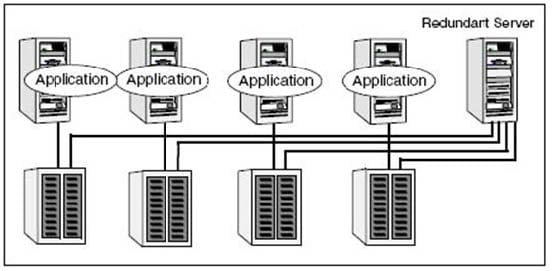Exam Details
Exam Code
:VCS-256Exam Name
:Administration of Veritas InfoScale Availability 7.1 for UNIX/LinuxCertification
:Veritas CertificationsVendor
:VeritasTotal Questions
:84 Q&AsLast Updated
:
Veritas Veritas Certifications VCS-256 Questions & Answers
-
Question 41:
Which resource type can an administrator use to mirror the state of another persistent resource?
A. Phantom
B. Proxy
C. VolumeSet
D. RemoteGroup
-
Question 42:
Which two capabilities can an administrator use to ensure availability within Docker Containers? (Select two.)
A. provide HA to the application within the container for failover and app restart
B. provide provisioning of a new container when an application within the container fails
C. first restart the application within the container and if continued app failures then provision a new container
D. provide HA to the container and move it between cluster nodes
E. provide provisioning of a new container when a container fails
-
Question 43:
A cluster administrator wants to deploy a complex cluster configuration that will include over six nodes, I/O fencing, and multiple private cluster interconnections. The administrator has a week to prepare before the actual cluster nodes become available for software installation.
Which method will help the administrator to implement rapid cluster deployment?
A. prepare a custom main.cf file using the sample template files
B. generate a custom installation script using the Veritas Services and Operations Readiness Tools (SORT) website
C. prepare a custom response file in Veritas InfoScale Operations Manager and push out to the new cluster
D. prepare a custom response file to build the new cluster configuration
-
Question 44:
Refer to the exhibit.
The exhibit shows an N-to-1 cluster configuration, in which nodes are connected to storage devices via dual-hosted SCSI cables.
Why is this an inefficient configuration?

A. Storage should be shared by more than two nodes, obtaining a N+1 cluster configuration.
B. Clusters should have at most two nodes.
C. NAS is preferred over SAN for shared storage.
D. NFS is the preferred way to share storage within a cluster.
-
Question 45:
What happens when an administrator executes hastop-local on a system that has an online service group which is frozen persistently?
A. HAD is killed on the system so the system state changes to faulted in the cluster.
B. HAD shuts down gracefully but leaves the application running.
C. The service group is evacuated to another system and HAD shuts down gracefully.
D. The command is rejected and HAD continues to run.
-
Question 46:
Which action is performed by the CoordPoint agent?
A. Is registers cluster nodes with coordination disks and coordination point servers.
B. It monitors only the coordination point server.
C. It monitors cluster node registrations with coordination point servers and SCSI-3 disks.
D. It removes offline cluster nodes from the coordination point servers.
-
Question 47:
Which behavior should an administrator expect when using the Veritas InfoScale Availability online upgrade process using the installer?
A. The cluster remains online and the kernel processes are swapped during the upgrade process.
B. The cluster is taken offline one node at a time during the package upgrade.
C. The cluster is taken offline during the upgrade process, but the applications stay online.
D. The cluster remains online until the next reboot and an alternative boot disk is used.
-
Question 48:
An administrator has a three-node cluster with low-priority heartbeat link and SCSI-3 I/0 fencing configured. Priority is given to node1, and each node is running a separate application. What will occur when all dedicated heartbeats fail at the same time?
A. The cluster faults and the subcluster with node1 in it panics.
B. The cluster moves all applications to node1.
C. The cluster continues to run without impact to the application.
D. The cluster faults and the subcluster with node1 in it remains online.
-
Question 49:
Which command can an administrator run on each node to gather logs containing information on the installed software, cluster configuration, systems, logs, and related information to create a file for Veritas Technical Support analysis?
A. /var/VRTSvca/logs/logcollect
B. /opt/VRTSvca/bin/hagetcf
C. /opt/VRTSvca/bin/nodedump
D. /opt/VRTSvca/bin/haconfig -dump
-
Question 50:
During a Veritas Cluster Server startup procedure, GAB fails and the administrator receives the following message:
vcs:11032 registration failed. Exiting
Which two files should the administrator check to ensure proper configuration? (Select two.)
A. main.cf
B. gabtab
C. inittab
D. vxfentab
E. llttab
Related Exams:
VCS-256
Administration of Veritas InfoScale Availability 7.1 for UNIX/LinuxVCS-257
Administration of Veritas InfoScale Storage 7.1 for UNIX/LinuxVCS-260
Administration of Veritas InfoScale Availability 7.3 for UNIX/LinuxVCS-261
Administration of Veritas InfoScale Storage 7.3 for UNIX/LinuxVCS-275
Administration of Veritas NetBackup 7.7 and NetBackup Appliances 2.7VCS-276
Administration of Veritas NetBackup 8.0VCS-277
Administration of Veritas NetBackup 8.0 and NetBackup Appliances 3.0VCS-278
Administration of Veritas NetBackup 8.1.2VCS-279
Administration of Veritas NetBackup 8.1.2 and NetBackup Appliances 3.1.2VCS-285
Veritas NetBackup 10.x and NetBackup Appliance 5.x Administrator
Tips on How to Prepare for the Exams
Nowadays, the certification exams become more and more important and required by more and more enterprises when applying for a job. But how to prepare for the exam effectively? How to prepare for the exam in a short time with less efforts? How to get a ideal result and how to find the most reliable resources? Here on Vcedump.com, you will find all the answers. Vcedump.com provide not only Veritas exam questions, answers and explanations but also complete assistance on your exam preparation and certification application. If you are confused on your VCS-256 exam preparations and Veritas certification application, do not hesitate to visit our Vcedump.com to find your solutions here.